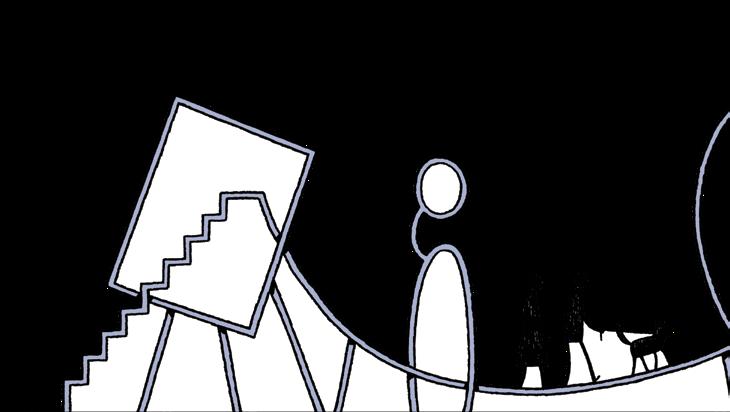The John Lewis Partnership provided a pension scheme and perks: clubs (am-dram, music, arts), entertainments, a pottery, a Lake District holiday hotel, a castle on Brownsea Island and a magnificent golf course at Cookham. Spedan began recruiting Oxbridge graduates – one of whom, Beatrice Hunter of Somerville, became Mrs Spedan Lewis. ‘I wish he weren’t so rich but no doubt I will get used to it,’ she wrote piously. Profit-sharing made the partnership morally acceptable. Spedan, unlucky in his children (a son died at nine, a daughter drifted away), ‘lived and breathed the Partnership’. He lectured and wrote proselytising books on ‘Partnership for all’, keeping three secretaries busy seven days a week, taking dictation. They were rewarded with riding and driving lessons, and outings to Glyndebourne, where Spedan was a keen patron. (During Glyndebourne’s wartime closure, he sat impresario Rudolf Bing at a desk in Peter Jones, advising ladies on how to spend their clothing coupons.) One of Spedan’s shrewdest moves was buying up the shops owned by a Mr Waite and a Mr Rose, offering ‘wholesome food in clean surroundings’. North London still mourns its indispensable John Lewis offshoots John Barnes and Jones Brothers – though both still thrive as the sites of gigantic Waitroses. So this engrossing tale of a shopkeeper and his family, from expansive entrepreneurship to the pandemic-related crisis of today, reflects our social history, as well told as it can be by a first-rate biographer with a name as dependable as her subject’s. By chance, this book arrived on my doormat along with a card. ‘You’ve earned a reward, Valerie,’ it said. ‘Your shopping at John Lewis in the last 90 days would have earned you 1,091 points – if only you’d paid with a Partnership Card.’ Too late!
Book of books FRANCES WILSON Index, A History of the: A Bookish Adventure By Dennis Duncan Allen Lane £20 As with any work of non-fiction, I began this one at the end. A quick glance through the index is the best way of finding the flavour of a book. But, because the publisher sent me a proof and not a finished copy, the index had not yet been compiled and, instead, beneath the word ‘Index’ on page 281 was a message for the reader:
‘The good news is you’ll have a condition named after you’
Indexes: necessarily produced late in publication cycle, 235; initial absence of, in books where the omission is striking, 199; author humbly seeks early readers’ indulgence for lack of, 281. It’s a witty idea in a book packed with easy wit and erudition. Dennis Duncan gives us not only a history of the index, but an essay on human folly. For example, when William F Buckley gave a complimentary copy of The Unmaking of a Mayor to his friend Norman Mailer, he included a personal message. Knowing that Mailer, a terrific narcissist, would turn straight to the back, Buckley scribbled ‘Hi!’ next to the entry ‘Mailer, Norman, 259, 320’. The index was invented at the turn of the 13th century. Its purpose was to provide a road map through the words and thus save us precious time – and by the middle of 16th century, Erasmus of Rotterdam wrote a whole book in the form of an index because, as he put it, these days ‘many people read only them’. In the 18th century, Dean Swift complained that lazy readers ‘are the men who pretend to understand a Book, by scouting thro’ the Index, as if a Traveller should go about to describe a Palace, when he had seen nothing but the privy’. An index, as Isaac D’Israeli nicely put it, provides ‘the nerves and arteries of a book’, which makes indexes sound more authoritative than they are. A good index has personality, but the best are utterly arbitrary. My mother, a deep and serious reader, compiled her own indexes because she trod her own path through a book and rarely wanted what the indexer thrust in her way. Many indexes are meat and two veg but some, says Duncan, are miniature narratives, while others are literary performances, and he provides glorious examples of both. Indexes can also be a
form of mockery or satire, and they make excellent objects of disdain. For example, look up the historian Edward Augustus Freeman in the index to J Horace Round’s Feudal England. You will find not a dispassionate finger pointing to a number of pages but an intellectual fist fight in which Round tears into the ‘scholarship’ of his rival: ‘Freeman, Professor: unacquainted with the Inq. Com. Cant 4; ignores the Northamptonshire geld-roll, 149’ – and so on and so forth. Let loose in the index, J Horace Round’s otherwise civilised tone turns sarcastic, but behaviour of this kind is not unusual in history books. ‘Let no Damned Tory index my History,’ said Macaulay of his History of England, fully aware that that rogue index was a lethal weapon. A good index, as the art historian William Heckscher put it at the Society of Indexers’ first international conference in 1978, should ‘pride itself on being the child of imagination’. Bernard Levin agreed. Seeing that the index to Ian Ker’s life of Cardinal Newman contained nothing but a list of numbers (‘Wiseman, Nicholas 69, 118-9, 129, 133-4’ ad infinitum), Levin let rip in the Times: ‘What’s the use of wasting space on idiocy of that order? How dare the publishers print it under the noble and meaningful heading “Index”?’ ‘Most biographies,’ quipped John Updike, ‘are just novels with indexes’ but some novels themselves have indexes. The index to Samuel Richardson’s seven-volume Clarissa - written by Richardson himself – ran to 85 pages and contained moral disquisitions on subjects such as duelling (‘An innocent man ought not to run an equal risk with a guilty one’) and adversity (‘the state of trial of every good quality’). The Oldie September 2021 55






































